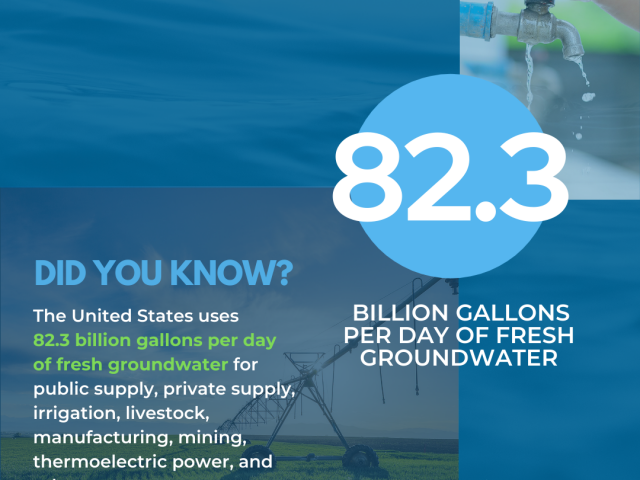It’s National Groundwater Awareness Week – How will you speak up for groundwater?

March 7, 2021 kicked off National Groundwater Awareness Week. It is a week dedicated to the advocacy of groundwater safety and protection and increasing its access across the country.
Groundwater is essential to sustain our daily lives, in fact, the United States uses 82.3 billion gallons of fresh groundwater per day for public supply, private supply, irrigation, livestock, manufacturing, mining, thermoelectric power, and other purposes. In Michigan, a little over half of the state’s population relies on groundwater in some capacity according to NGWA.
Few states can accurately or confidentially determine how many residential wells are in place. For each region, the American Housing Survey by the U.S. Census provides regional data. Michigan is found in the Midwest, along with these other states: Ohio, Michigan, Indiana, Illinois, Wisconsin, Minnesota, North Dakota, South Dakota, Iowa, Nebraska, Kansas, and Missouri. The last American Housing Survey Census indicates this region had 3,990,0002 households served by residential wells, with an average of 2.523 persons per household. The USGS estimates the population of self-supplied water supply users in Michigan to be 2,600,000 with 100% of their supply from groundwater.
• 1,075 community water systems use groundwater for 1,683,200 people
• 1,302 non-community, non-transient water systems use groundwater for 306,500 people
• 7,921 non-community, transient water systems use groundwater for 1,117,600 people
• 7,550 irrigation wells used serving 2,820 farms and 467,000 acres
You can visit EGLE’s Water Well Viewer map to see a map of all the wells in Michigan as well as wellhead protection areas.
As you can see, very many sectors rely on groundwater, which makes it all that more crucial we do our best to protect it. If you have a private well and you want to safeguard your health and make sure your protecting our groundwater, watch this helpful video by NGWA.
Tips for practicing Groundwater Awareness Week in your home, Courtesy of WellOwner.org
- Why Is a Checkup Important? A properly constructed and maintained household-supply well will provide you with many years of quality service. Routine inspection of a water well system can help ensure it is operating properly, prolong its useful life, and protect your investment. Most importantly, inspections can protect your health by discovering issues that could result in water quality problems presenting a health risk.
- Keep hazardous chemicals, such as paint, fertilizer, pesticides, and motor oil far away from your well, and maintain a “clean” zone of at least 50 feet (15.24 meters) between your well and any kennels or livestock operations. Also, always maintain proper separation between your well and buildings, waste systems, or chemical storage areas. Your professional water well contractor is familiar with the applicable local codes.
- Get your water tested anytime there is a change in taste, odor or appearance, or anytime the system is serviced.
10 Ways to Protect and Conserve Groundwater
- Go Native
- Use native plants in your landscape. They look great, and don’t need much water or fertilizer. Also choose grass varieties for your lawn that are adapted for your region’s climate, reducing the need for extensive watering or chemical applications.
- Reduce Chemical Use
- Use fewer chemicals around your home and yard, and make sure to dispose of them properly – don’t dump them on the ground!
- Manage Waste Properly
- Dispose of potentially toxic substances like unused chemicals, pharmaceuticals, paint, motor oil, and other substances. Many communities hold household hazardous waste collections or sites – contact your local health department to find one near you.
- Don’t Let It Run
- Shut off the water when you brush your teeth or shaving, and don’t let it run while waiting for it to get cold. Keep a pitcher of cold water in the fridge instead.
- Fix the Drip
- Check all the faucets, fixtures, toilets, and taps in your home for leaks and fix them right away, or install water conserving models.
- Wash Smarter
- Limit yourself to just a five minute shower, and challenge your family members to do the same! Also, make sure to only run full loads in the dish and clothes washer.
- Water Wisely
- Water the lawn and plants during the coolest parts of the day and only when they truly need it. Make sure you, your family, and your neighbors obey any watering restrictions during dry periods.
- Reduce, Reuse, and Recycle
- Reduce the amount of “stuff” you use and reuse what you can. Recycle paper, plastic, cardboard, glass, aluminum and other materials.
- Natural Alternatives
- Use all natural/nontoxic household cleaners whenever possible. Materials such as lemon juice, baking soda, and vinegar make great cleaning products, are inexpensive, and environmentally-friendly.
- Learn and Do More!
- Get involved in water education! Learn more about groundwater and share your knowledge with others.
